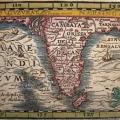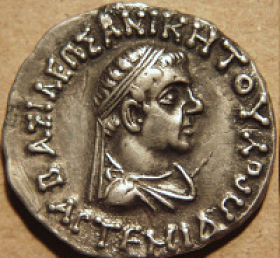59. Looking East: Indian Influence on Greek Thought
Did Indian ideas play a role in shaping ancient Greek philosophy?
Themes:
• C.I. Beckwith, Greek Buddha: Pyrrho’s Encounter with Early Buddhism in Central Asia (Princeton: 2015).
• G.P. Conger, “Did India Influence Early Greek Philosophy?” Philosophy East and West 2 (1952), 102-28.
• E. Flintoff, “Pyrrho and India,” Phronesis 25 (1980), 88-108.
• P.M. Gregorios (ed.), Neoplatonism and Indian Philosophy (Albany: 2002).
• R.B. Harris (ed.), Neoplatonism and Indian Philosophy (Albany: 1982).
• K. Karttunen, India in Early Greek Literature (Helsinki: 1989).
• J. Lacrosse, “Plotinus, Porphyry and India: a Re-Examination,” in P. Vassilopoulou (ed.), Late Antique Epistemology. Other Ways to Truth (New York: 2009), 103-13.
• T. McEvilley, The Shape of Ancient Thought (New York: 2002).
• D.H. Sick, “When Socrates Met the Buddha: Greek and Indian Dialectic in Hellenistic Bactria and India,” Journal of the Royal Asiatic Society 17 (2007), 253-78.
• R. Seaford, The Origins of Philosophy in Ancient Greece and Ancient India: a Historical Comparison (Cambridge: 2020).
• J.F. Staal, Advaita and Neoplatonism: a Critical Study in Comparative Philosophy (Madras: 1961).







Comments
more episodes?
Love the podcast series. I wanted to know how many more episodes are there in the Indian series and what will you be covering in those?
In reply to more episodes? by Ashish
What's left
We are almost done with India, for now at least: after this is an episode dealing with later influence from India on Europe then a final scripted one on later Indian philosophy, just a quick overview of what we would cover if we come back to do another series on India. Then a Surprise Interview Guest, and then we will be on to the Africana series.
Plotinus in Persia
Thanks for another wonderful episode! One thing that strikes me as really intriguing about Plotinus accompanying Gordian III on his expeditions to Persia is that, if I read the timelines correctly, sitting right there in the court of the Sassanids was Mani, who had just returned from from India. So if Plotinus had succeeded in his goal of making contact with Eastern philosophers, there's a good chance we could have had an encounter between the founder of Neoplatonism and the founder of Manicheanism, which is a really tantalizing prospect!
An addition to the Further Reading
Vishwa Adluri, ‘Plotinus and the Orient: aoristos dyas’ in Pauliina Remes and Svetla Slaveva-Griffin (eds.), The Routledge Handbook of Neoplatonism (Abindgon, 2014), 77-99.
In reply to An addition to the Further Reading by Simon
Further reading
Good grief, I overlooked that which is unbelievable given that I have a piece in the same volume! Thanks.
Indian Influence on Greek Thought
Maybe the the two people, the greek and the indians, have their mutual spirtual and intellectual roots much deeper, both being indo-european people, back in their caucasian homelands. It is hard not to see the similarities between the greek and the norse concept of deities and probably also the hindi world of gods (which I disgracefully know too little about). Likewise, philosophical thoughts in both Greece and India may find their roots in much older thoughts in a mutual past, now long forgotten
In reply to Indian Influence on Greek Thought by Chris Forster
Deeper roots
Yes, I think we mention in the episode that this seems to be a preferred explanation in the work of McEvilly. Of course it's the sort of thesis that is hard to prove or disprove, and too vague to be of much use to the historian of philosophy - but that doesn't mean it isn't true!
In reply to Deeper roots by Peter Adamson
New traveller
Sorry, I missed this point about the work of McEveilly. I must have been making coffe when this was pointed out. Of course I agree with you in the vagueness of such speculations. By the way, thank you for this philosophical tour de force. I have just joined, and I am looking forward to the journey ahead.
In reply to New traveller by Chris Forster
Coffee
That's ironic because if it wasn't for coffee I wouldn't be able to produce the podcasts at all!
But seriously, glad you have found the podcast, hope you enjoy the trip!
In reply to Indian Influence on Greek Thought by Chris Forster
Indo-European
The whole idea of a common Indo-Eoropean people is being negated in India and the new narrative is that, Indian/Vedantic thought developed in India, from where it travelled both East and West creating channels of cltural influence and thought. Excavations in India and dating of astronomical phenomena as mentioned in the Ramayana, the Mahabharata and the Puranas, now push the age of the Harappan/Hindu civilization back by several thousand years from that envisaged by the British and other European scholars who had limited understanding of Indian texts. It is also felt that there were colonial vested interests at play in creating a super race of Indo-Europeans, as later seen in the Aryan theory of Adolf Hitler. This theory has had unfortunate echoes in India too, with a Dravidian race theory gaining space without any credible data to support it, but crude political gamesmanship.
In reply to Indo-European by Nagaraj Subbarao
Indo Europeans
Yes, I'm definitely no expert on this but what you say broadly coheres with what I gleaned from the background reading I did, which is why we were pretty careful about talking about cultural origins in the first few episodes of the series.
In reply to Indo-European by Nagaraj Subbarao
Indo-European
Thank you for pointing this out. The Aryan-invasion theory foisted by the Brits has been demolished yet there are those who still don't want to acknowledge the real antiquity of India as a civilisation. Also, please note there are works underway that are tracking the journey of ideas from India to China, to the Arab world and from there to Europe. So, it is QUITE in the realm of possibility that Indian thought influenced Greeks and not the other way around as is popularly suggested.
In reply to Indo-European by Pujita Krishna
Greece and India
Actually we talk about that idea in episode 59 (though as you'll see we adopt a guarded skepticism): I agree though that if there is a case to be made it is probably about Indian influence on Greek thought, not the other way around.
Look at Other Infilitrations for More Information
If you look at the history of Hippocratic medicine and Ayurveda I think you will find more detailed comparisons of cultural exchange which lines up with what you suggest here - namely that ideas that came in from India to the west were misinterpreted and poorly understand due to issues with transmissions or natives not fully sharing their systems. The reason I posit an east to west movement is that in the "bible" of Ayurveda ( Charaka) we see a fully formed system circe roughly 4-600 BC ( there are variation on this dating), but it undoubtedly had deeper oral roots and we see that the full ideas represented there only slowly start making their way into Hippocratic related traditions over much later time periods ( which coincides with deeper involvement-interchange between these cultures). Vicki Pitman wrote a thesis/book on this, though wasn't arguing history so much as comparing the systems, but if you put two and two together....
Furthermore, and something that can't be debated, is that the Greeks had NO system of astrology until Alexander the Great imported things from Babylonia. There are clear reference to the greatness of Chaldean astrologers and those from the east. Ancient Indian/Vedic culture undoubtedly stretched right up to this area or had interchange with it, and we see great traditions of astrology from this culture. This is a little more complex, and eurocentric academics like David PIngree have documented how much ideas from Greek and Indian astrological texts are similar. HOWEVER, he claims the reverse pollination even though - once again as we see in the Ayurvedic texts - India has a MUCH more stable and significant tradition in this field of knowledge, which only portions of confused/altered fragments seem to be found in later Hellenistic sources. To assume such a large and significant astrological tradition just sprung up overnight when the Greeks decided to bring it over to India is pretty much a racist and bigoted view if you ask me.
In reply to Look at Other Infilitrations for More Information by Frank
Blurry transmission
Thanks for those thoughts - that does line up very well with what we argued in this episode, you're right. I think with medicine one sees a very similar pattern of things that look similar at first but not so much on further inspection. Astronomy and astrology may be an exceptional case; I've noticed that this science is often a forerunner of other cultural exchanges, and may sometimes be transmitted earlier or more completely than other fields of knowledge; this happened with the India/Arabic transmission to some extent, for instance.
Charvaka school and atomism
i didn't know much about indian philosophy having influence on greek philosophy until i read about the concept of atomism in charvaka and jain schools of philosophy in india. charvaka school proposed theory of atomism a long time before the greeks proposed the same thing, nearly two to four hunfred years, atomism is clearly a big influence of indian philosophy on greek one, and should have been discussed, regards.
In reply to Charvaka school and atomism by Hammad
Atomism
Actually atomism in classical India is, if I'm not wrong, most especially associated with Vaisesika and not so much with Carvaka. So we discussed it there: if you check out especially episode 37 it is all about Indian atomic physics.
Also not that it really matters but your chronology sounds wrong to me: I don't know who you are thinking about as the originators of Carvaka materialism but if we take Ajita and Payasi as the earliest representatives of this movement they are around the same time as the Greek atomists (5th c BC) because they are supposedly contemporaries of the Buddha. Lots of confusion about the dates here, but it can't have been anything like 400 years earlier.
Greek Philosophy
Has ancient Greeks influenced Indian culture. I think, there is a possibility because Alexander did visit India and he had colonies around India.
In reply to Greek Philosophy by Mr. Suresh Patel
Influence
There are actually whole episodes in this series devoted to your questions: check out the India series episode 59 for Greece and India (though that is more about Indian influence on Greek philosophy than the other way around, which I think is unlikely), and 122 under Philosophy in the Islamic World for Greece and Islam.
Works of Aristotle
It is said that the works of Aristotle were lost to the West for many centuries. It seems the Arabs had preserved the works of Aristotle for all those centuries. How did the Arabs get the works of Aristotle?
The Other Way
I know this episode was mostly speculation, but it was mostly focused on a possible 1 way exchange from India to Mediterranian Greeks. Is there also speculation going the other way, for Greek philosophy influencing Indian? I imagine, if there is, most of it will be centred on the Indo-Greek "Yavanika" sources.
In reply to The Other Way by Alexander Johnson
Other way
Yes, I thought about that when we were writing the episode. The reason we focused on the India-Greece direction and not the other way around is mostly that this is where more research has been done, and I think it is generally thought that this is more plausible for cultural and historical reasons. But maybe also because (and we complained about this) it would somehow "legitimate" interest in Indian thought if it turned out to have influenced Greek thought whereas no one thinks Greek thought is in need of legitimating. Anyway it is worth looking into but for the record I am pretty skeptical about substantive and formative influence in either direction, though I would certainly not rule out occasional and less decisive influence. But I only looked into it for a few weeks, not the years that would be necessary for a really informed judgment.
Another example
Interestingly, Sonam Kachru at UVA recently published a short article on another example. In chapter 3 of Vasubandhu's AKBh, there's a comment about insects growing in molten iron. Apparently, Aristotle says the same thing in book 5 of History of Animals.
Common origin?
The idea that some ancient indian and greek ideas might have a common origin, suggests a project to me. Following the example of the linguists, someone might try to deduce the ideas of the old indo-europeans. It would be a great adventure, certainly. Travelling through western and central Asia, ransacking the back closets of museums and old monasteries, looking for people who can translate tocharian and scythian, and maybe lamenting the scarcity of giraffes. Hmm, i almost said "shortage of giraffes", but that of course would have been a category error.
In reply to Common origin? by Lee Grixit
"Shortage of giraffes"
Oh my, look out for an episode sometime soon where I shamelessly steal this joke!
Oh, also, about the "Liar's Paradox"
The "Liar's Paradox" was mentioned earlier in this series. Previously, i had just considered it from a meta standpoint. The phrase "this statement is no true" only produces a paradox in its own internal context. I am outside that context and so observe that it is only a string of words. It's the same as observing that there are not two hands drawing each other, there is only a drawing, produced by Escher, who is outside its context. However, after hearing you and your guest bring it up, i had a new thought. And that is that the statement is effectively false (or maybe falacious?) in that it claims to describe itself but it cannot.
In reply to Oh, also, about the "Liar's Paradox" by Lee Grixit
Liar paradox
Yes that is one traditional approach to solving the paradox. The problem is that it seems like a fairly ad hoc solution. More generally sentences can most definitely impute falsehood or truth to other sentences ("everything you just said was false"), so there is clearly no general bar to sentences describing sentences as true or false. As for self-referential sentences, cases like "this sentence is in English" and "this sentence is true, if it is true" don't raise any alarm bells for us, and seem to describe themselves perfectly well. So why would the liar statement fail to do so?
Why no mention of Ashoka?
It seems to me that Ashoka's legacy would be a good place to look?
In reply to Why no mention of Ashoka? by Johnny Allison
Ashoka
Well, episode 11 in this series talks about Ashoka, but maybe you mean why was he not mentioned in this episode on the influence of Indian philosophy on European thought? When I did the reading for this I never saw any suggestions in that direction (and our own knowledge of him mostly comes from inscriptions unearthed by archeologists within the last couple hundred years) so I am not sure what the vector of influence would be, but I would be interested to hear more about the idea. Just basically that he was a powerful king who espoused some philosophical (Buddhist) ideas, including beyond the edges of his empire?
McEvilley controversy
I have become very interested in the exchanges between India and Greece since reading McEvilley's book. I have since come to understand that there is considerable controversy regarding his opinions directly focused on him and his methodology. Is this at all an important concern?
I recognize that the standards of proof in the history of philosophy as practiced in the West require written evidence of contact or translation. Does the general controversy over transmission (either direction) seem to be based on that and that alone - the absence of written evidence?
Otherwise the impression of a East to West transmission - or a common photo-Indo European origin - seems overwhelming.
(Personally I am veering towards a common psychological foundation in the experiences of itinerant mystics living in caves favoried by people like Yulia Ustinova and Lewis-Williams. I believe this is part of a new interest in what is being called 'neuro-theology'. But again, this path also seems impossible to prove by the current standards of history of philosophy. But I am wondering if these standards are being applied in order to control (or stifle) research in areas that are just too vulnerable to speculation and manipulation.)
In reply to McEvilley controversy by Tony Heiderer
McEvilley
Well, the funny thing about McEvilley's book is that it itemizes a wide range of parallels between Greek and Indian thought, but without really saying much about the possible historical connections though it is clear he thinks there are some. Maybe his idea is that the parallels are so numerous and powerful that it proves some kind of influence, and we can then bracket the perhaps unanswerable question of exactly how that influence occurred. Personally I found his examples to vary in terms of how convincing they are but some are very striking.
I would distinguish between this question and the sort of thing you mention at the end of your comment, which is I guess not about historical connections at all but just similar patterns of thought that arise over and over all across human history.
Add new comment